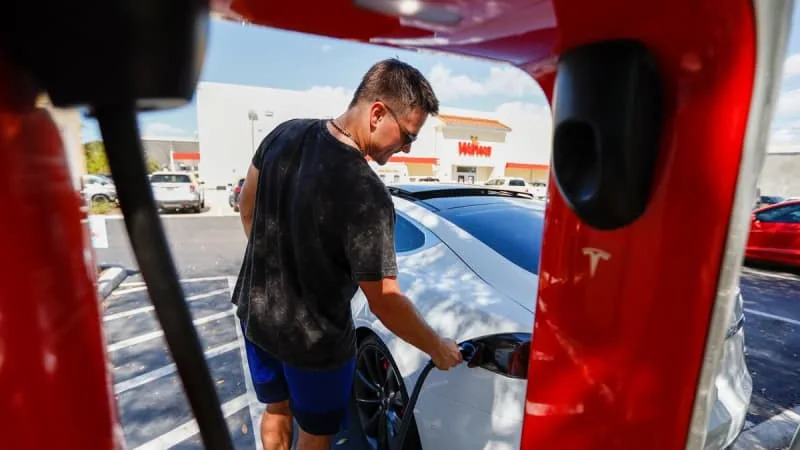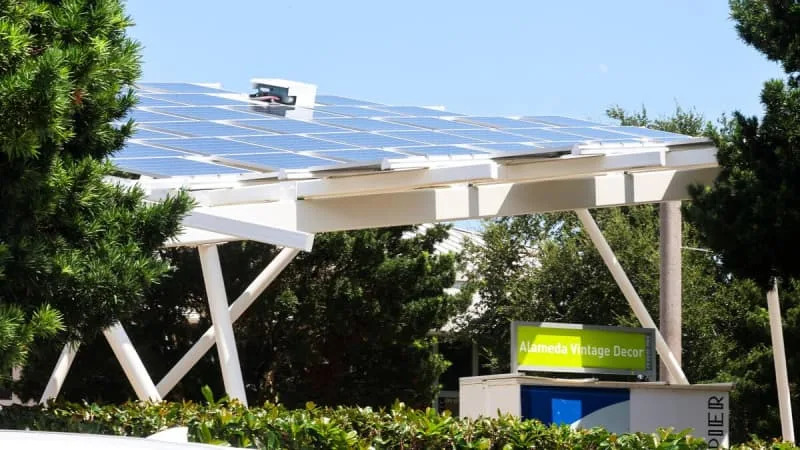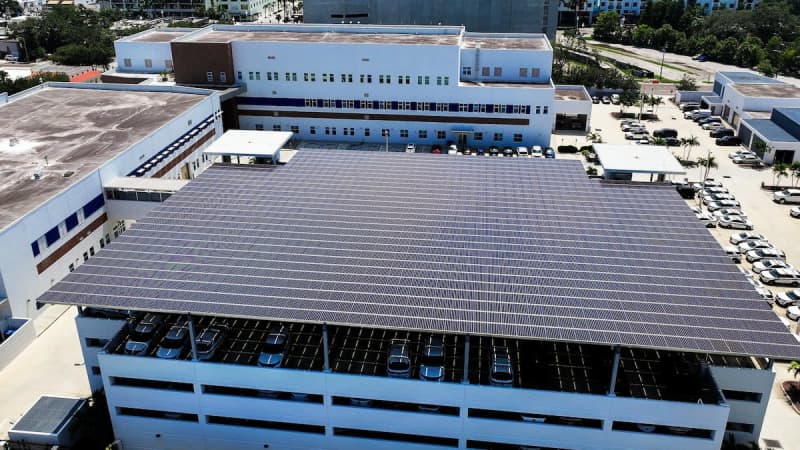Across Tampa Bay, local governments have tried to address threats posed by human-caused climate change, like rising temperatures and increasingly devastating hurricanes.
St. Petersburg has reduced its reliance on fossil fuels powering city-owned buildings. Pinellas County once viewed electric vehicles as cost-saving, though it recently paused its EV program. Hillsborough County tallies energy savings in the millions now that its investments in solar have matured.
That progress may all be at risk now that Florida’s Department of Government Efficiency has targeted clean energy initiatives and carbon reduction strategies crafted by local leaders. State auditors, tasked with rooting out waste, fraud and abuse, requested municipalities provide them information on any “Green New Deal” policies.
They received thousands of pages of documents, spreadsheets and slide decks they had demanded from St. Petersburg and Hillsborough and Pinellas counties.
Here’s what local governments shared with DOGE.
The state’s first climate change-focused request asked local governments to disclose any carbon emission goals that had been set by local leaders.
St. Pete has adopted ambitious targets to cut its reliance on fossil fuels completely by 2035, though how much progress has been made is unclear, the Tampa Bay Times previously reported.
In 2016, it became the first city in Florida to commit to a switch to clean energy that would power all homes, businesses and other infrastructure within city limits.
State auditors also asked for copies of the city’s contracts with Michael Bloomberg’s philanthropy. In 2019, the billionaire former New York City mayor’s organization pledged $2 million worth of technical support to help St. Petersburg meet its carbon reduction initiatives.
The Bloomberg money fully funded the city’s Integrated Sustainability Action Plan, its guiding climate resiliency roadmap.
During staff’s latest presentation on the plan to the city’s Health, Energy, Resiliency and Sustainability Committee in July, they announced 33% of municipal electricity came from clean energy sources last year. Staff also highlighted ongoing green energy projects, including scaling up its solar co-op, creating more electric vehicle infrastructure and establishing EV incentives.
Since 2012, the city has spent about $5 million on solar panels, $416,000 on electric vehicles and $1.7 million on consultants to reach its net-zero emissions goal, according to records submitted to the state DOGE.
Kevin Moran, director of Hillsborough County’s environmental services division, wrote to auditors that his department has developed “sustainability and resiliency policies that protect” people and propertythat meet requirements to receive state funding.
“The Hillsborough County Board of County Commissioners has not adopted any emissions reductions or carbon reducing targets. I’m not aware of any alternatives considered in place of actual targets,” Moran wrote.
Shortly afterRepublicans won all but one seat on the Pinellas County commission and months before DOGE came knocking, the board passed a sweeping ordinance that ended county efforts to lower its carbon footprint.
The county previously strove toward targets of reaching 50% renewable energy by 2030 and cutting fossil fuels completely by 2050. Those were discarded in April, alongside two other environmental policies.
At the same time that Pinellas Countyabandoned its emissions goals andpulled out of Duke’s Clean Energy Connection program, commissioners passed a restriction on electric vehicle purchases for the county’s fleet.
A copy of that ordinance was the first of 78 pages submitted to auditors detailing the county’s climate change policies.
The EV measure requires a financial analysis be presented to the board that demonstrates the fiscal benefits of EVs, like one prepared by consultants in 2021.
Consultants estimated Pinellas County could cut emissions from county-owned vehicles 23% by switching to EVs. It would also save the county $364,000 each year in gas, maintenance and parts, they wrote in a memo.
The county began buying EVs shortly after receiving the consultants’ memo and has bought 17 vehicles to date, costing nearly $800,000, records submitted to thestate DOGE show.
Those purchases have halted since leaders paused EV spending to reassess the cost-benefit of an electric fleet.
St. Petersburg has mandated that all new administrative vehicles be fully electric or plug-in hybrids, according to city records.
But city staff said there could be some downsides: Combustion engines are better suited to extreme weather and towing than EVs.
Between 2020 and 2022, the city purchased 13 electric Nissan Leafs priced similarly to other combustion engine vehicles, staff wrote to auditors.
“The cost per mile is similar to a Corolla hybrid,” they wrote. “Our data does show that the annual maintenance cost on the Nissan Leafs has been lower than other similar sized vehicles.”

Hillsborough County has 26 EVs in its fleet, which cost $1.3 million — a sliver of the fleet’s total value of about $260 million.
The county has also installed 37 chargers that total $126,000. Seven chargers are available to the public and have added $18,600 in revenue to Hillsborough County coffers since 2018. Hillsborough staff wrote to auditors that the county does not plan to continue funding the public EV program because it was only seeing a profit margin of 6% each year.
Hillsborough County has spent $7.5 million on solar energy infrastructure for 25 buildings since 2018.
The county has saved $2.3 million in energy costs and offset about 9,400 metric tons of carbon dioxide emissions, which is equal to nearly 2,000 homes’ electricity use for one year, “as a result of this investment in clean energy,” staff wrote to auditors.
Hillsborough County has allocated $650,000 for future solar installations.
St. Petersburg says its city-owned solar panels have created nearly $900,000 in energy savings since 2019, records show.
Pinellas did not supply records to DOGE regarding municipal solar. The county has installed rooftop solar panels at its downtown energy plant, according to its website.
Florida’s DOGE team expects to release its assessments on local governments’ spending within 60 days of an in-person audit. For Tampa Bay municipalities, that would set the state’s self-imposed deadline for mid-October.

• • •
The Tampa Bay Times launched the Environment Hub in 2025 to focus on some of Florida‘s most urgent and enduring challenges. You can contribute through our journalism fund by clicking here.
